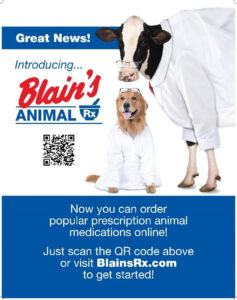The U.S. Food and Drug Administration (FDA) has announced a significant regulatory change affecting certain over-the-counter animal medications, prompting a shift towards prescription-only status. This decision, aimed at enhancing oversight and safety, particularly impacts medications commonly used by farmers and horse owners, such as oxytetracycline.
Oxytetracycline, previously as accessible as ibuprofen for farmers, has now become subject to the prescription-only rule, highlighting the need for alternative solutions and streamlined processes in veterinary care.
The transition to prescription status has raised concerns among farmers and animal owners regarding the purchasing process, especially during critical periods like calving season.
“This regulatory change underscores the importance of accessible and efficient means for obtaining necessary medications for farm animals and pets,” explains Chris Ramos, public relations and events coordinator for Blain’s Farm and Fleet.
In response to these challenges, various entities in the agricultural community have stepped in to address the evolving needs of farmers and pet owners. Among them, Blain’s Farm and Fleet has initiated efforts to support its customer base through the implementation of the Animal RX program.
Recognizing the significance of calving season and the essential role of farmers in maintaining animal health, Blain’s Farm and Fleet views itself as a reliable source of expertise in animal care. Animal RX serves as an additional outlet to facilitate the procurement of prescription medications for both farm animals and pets, ensuring continuity of care during critical periods.
Animal RX operates within a framework that respects the primary role of veterinarians in prescribing medications. While the prescription process still begins with a veterinarian, Animal RX provides a convenient platform for fulfilling prescriptions, thereby easing the transition from over-the-counter to prescription medications.
“The Animal RX program currently focuses on filling the most common prescription needs, with plans for expansion to encompass a broader range of medications in the future,” says Ramos. “Through partnerships with veterinarians and a commitment to affordability, we aim to ensure that prescription medications remain accessible to farmers and pet owners alike.”
It is important to note that Animal RX does not replace the expertise of veterinarians but rather complements their role in animal healthcare. Since its inception, Animal RX has received positive feedback from farmers and industry stakeholders, signaling its growing importance in discussions surrounding animal health and welfare.


